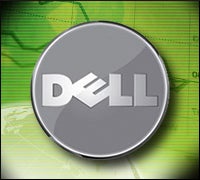 |
The figures from HP’s earnings last week were ominous. Take away EDS and the rest of its sizable services business, and HP might very well have been thrown for a loss. The Enterprise Storage and Servers group fell 28 percent, the PC group was flat but earnings fell 19 percent and the Imaging and Printing Group (IPG) fell by 23 percent.
All in all, not a great omen for Dell (NASDAQ: DELL), which is slated to report its first-quarter earnings tomorrow — and which has a great deal in common with HP, minus the larger company’s printing and services business.
Dell also has greater exposure because much of its business is based in the U.S., whereas HP has a more global reach. HP gets 69 percent of its business from outside the U.S. (as per its 10-K filing with the SEC) while Dell gets 48 percent of revenue from outside the U.S. (as per its 10-K).
Wall Street is expecting a drop in sales. An average of 26 analysts surveyed by Thompson Reuters puts first-quarter sales, which ended at the end of April, at $12.68 billion, a 21.1 percent drop from the same quarter in 2008. Earnings per share is estimated to be around $0.23, a 32 percent drop from the $0.34 EPS of Q1 2008.
That’s simply not encouraging no matter how you spin it. Dell had been on a rebound since the return of founder Michael Dell as CEO, but its growth has stalled with the economy, and its stock has plunged. It’s down almost 50 percent in the past year. That’s what happens when you’re a one-trick pony and the one trick doesn’t sell.
Dell has expanded its business in two directions, up and down. It has introduced new netbooks, the Inspiron Mini 9 and Mini 10, which start at $249, and the high-end Adamo, a $1,999 meant to compete with Apple’s sleek and pricey MacBook Pro. At the same time, Dell is being aggressive in its attempts to cut out expenses, ranging from unproductive factories to excessive packaging in its boxes.
Like other tech firms, Dell has been preparing for these lean times by getting lean. It announced in January plans to cut annual expenses by $4 billion within three years, up from its previous plans to reduces expenses by $3 billion within three years. Wall Street has taken notice.
“[W]e are picking up that Dell is taking a more active approach in walking away from aggressive pricing and managing its expenses better,” Shaw Wu, an analyst with Kaufman Brothers, wrote in a note to investors.
But he added that Dell has been hurt by its reliance on business customers, which have cut back on purchases even more than consumers.
PC sales, except for low-margin netbooks, are in the toilet. This current quarter is considered one of the slower quarters as well, and likely accelerated by the fact the economy remains stalled and sales will be delayed with the impending release of Windows 7. On the conference call with analyst last quarter, CFO Brian Gladden specifically said the firm expects Windows 7 will drive sales, but there will be a delay in purchasing its release.
Analyst projections don’t go beyond the current quarter. Thompson Reuters estimates put Q2 sales, which end in July, at $12.78 billion and EPS at $0.24, only slightly better than this current quarter.
Beyond that, it’s too soon to make any estimates on Q3, which includes back-to-school and if all goes according to plan, the release of Windows 7.


